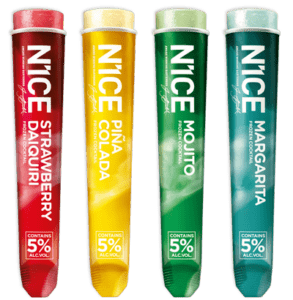News
Popsicles laced with alcohol can now legally be sold to children in Denmark
This article is more than 9 years old.
Yes, you read that right

Some think N1ce is not so nice for kids (photo: N1ce.com)
The push-up popsicle ‘N1ce’ which contains five percent alcohol and comes in flavours like mojito, margarita and daiquiri is now legal in Denmark.
The frozen treat was launched in Sweden last year and some 1.5 million have been sold thus far.
“N1ce is now available in a few Danish shops, Bakken and at several summer festivals,” founder Mikael Drane, who has launched the product with the Swedish DJ-duo Axwell & Ingrosso, told Metroxpress.
“They are covered by an EU rule that allows shops to legally sell products with up to five percent alcohol to children, but we are asking Danes to follow the country’s 16-year-old rule.”
Over the line
An ice cream called ‘Vodka-Goblin’ that combined red soda and alcohol was pulled from the shelves 13 years ago.
The alcohol abuse prevention group Alcohol og Samfund believes N1ce should be yanked as well.
“It is a bad idea,” said the group’s chairperson Anette Søgaard. “Popsicles are something that usually only children eat, and how can they distinguish what contains alcohol and what does not. It is irresponsible.”
READ MORE: Government to help young victims of alcohol and drug abuse
Socialdemokraterne consumer spokesperson Karin Gaardsted thinks N1ce comes too close to crossing the line.
“It is at the limit of what you can do within the law,” she said. “We need to protect children from this kind of thing.”
Coop opting out
Coop supermarkets will not be selling N1ce.
“We will in principle not sell things with alcohol that could be confused with candy to children,” said Jens Juul Nielsen, information head at Coop.










































